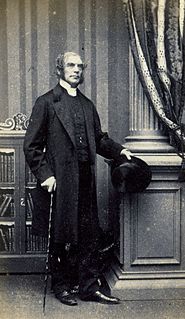A Quote by John Piper
The wisdom of God devised a way for the love of God to deliver sinners from the wrath of God while not compromising the righteousness of God.
Quote Topics
Related Quotes
What is sin? It is the glory of God not honored. The holiness of God not reverenced. The greatness of God not admired. The power of God not praised. The truth of God not sought. The wisdom of God not esteemed. The beauty of God not treasured. The goodness of God not savored. The faithfulness of God not trusted. The commandments of God not obeyed. The justice of God not respected. The wrath of God not feared. The grace of God not cherished. The presence of God not prized. The person of God not loved. That is sin.
Wrath, unlike love, is not one of the intrinsic perfections of God. Rather, it is a function of God's holiness against sin. Where there is no sin, there is no wrath-but there will always be love in God. Where God in His holiness confronts His image-bearers in their rebellion, there must be wrath, or God is not the jealous God He claims to be, and His holiness is impugned. The price of diluting God's wrath is diminishing God's holiness.
It has been said that God's gift is also indescribable because of the grace by which it is given. God, who is rich in mercy, gave the world the gift of His dear Son while we were at enmity with Him. Paul says: 'But God commendeth His love toward us, in that, while we were yet sinners, Christ died for us' (Rom. 5:8). Therefore, in Him we are freely given all things: redemption, forgiveness of sins, righteousness, peace, hope, wisdom and knowledge.
It is no strain of metaphor to say that the love of God and the wrath of God are the same thing, described from opposite points of view. How we shall experience it depends upon the way we shall come up against it: God does not change; it is man's moral state that changes. The wrath of God is a figure of speech to denote God's unchanging opposition to sin; it is His righteous love operating to destroy evil. It is not evil that will have the last word, but good; not sorrow, but joy; not hate, but love.
When we look at the cross we see the justice, love, wisdom and power of God. It is not easy to decide which is the most luminously revealed, whether the justice of God in judging sin, or the love of God in bearing the judgment in our place, or the wisdom of God in perfectly combining the two, or the power of God in saving those who believe. For the cross is equally an act, and therefore a demonstration, of God’s justice, love, wisdom and power. The cross assures us that this God is the reality within, behind and beyond the universe.
The motive is this, 'Oh! that God could be glorified, that Jesus might see the reward of his sufferings! Oh! that sinners might be saved, so that God might have new tongues to praise him, new hearts to love him! Oh! that sin were put an end to, that the holiness, righteousness, mercy, and power of God might be magnifi ed!' This is the way to pray; when thy prayers seek God's glory, it is God's glory to answer thy prayers.
When the Holy Spirit comes to live within you, He will come with the ability to produce righteousness. Righteousness is the nature of God, which when imparted to the human spirit, produces the rightness of God in the human spirit. It gives man right standing with God; it gives him the ability to stand in the presence of God without a sense of guilt, inferiority or condemnation. It means rightness in God. The righteousness of God is wrought in you.
You are not called to believe in your love to God, but in God's love to you! Do not argue, 'I cannot love God! I have striven to my uttermost to do so, but have failed in all my endeavors, until in despair I have abandoned the thought and relinquished the attempt.' Be it so- no effort of your own can strike a spark of love to God from your heart. Nor does God demand the task at your hands. All that He requires of you is faith in His love, as embodied and expressed in Jesus Christ to poor sinners.
Indeed all the saints are taught the same lesson - to renounce their own strength, and rely on the power of God; their own policy, and cast themselves on the wisdom of God; their own righteousness, and expect all from the pure mercy of God in Christ, which act of faith is so pleasing to God, that such a soul shall never be ashamed.
A Christian should know that God is a Creator, that God is an entity that is all-powerful and all knowledgeable, God is everywhere and God is an entity filled with grace, love, compassion and forgiveness, that Jesus is the son of God and Jesus came on earth to explain to people in a very revolutionary way the nature of God, that God was not a stern judge who was keeping track of 600 or so rules and regulations that you had to keep in order to be acceptable to God.

































